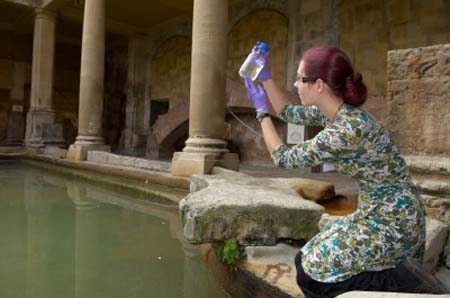Could there be the beginnings of biofuel in your desperately-in-need-of-cleaning bathtub?
Probably not, but researchers say they are looking closely at the algae growing in England’s famed Roman Baths for insights into obtaining and possibly growing new sources of oil.
Algae is becoming one of the main focuses for creating biofuel because it can be grown quickly and requires less space than traditional biocrops.

But what’s so special about the algae at the Roman Baths?
Well, researchers from the University of Bath and University of West England say that while most algae grows happily around 25 degrees Celsius (77 degrees Fahrenheit), the ones in the baths grow at much higher temperatures.
In fact, researchers have found that algae can grow in the King’s Bath, which maintains a temperature of 46C (120F), and the Great Bath, at 39C (102F). The researchers have identified seven algae varieties.
They’re growing each one over a range of temperatures and comparing them to the standard algae being developed for biodiesel. The hope is that one of the seven will be well adapted to growing in higher temperatures.
But temperature isn’t the only factor when considering algae. Currently, breaking down algae to create biofuels isn’t cost- or energy-effective. Typical algae cell walls are difficult to break, making extraction of the oil fairly energy intensive.
The researchers from the two universities are looking for algae that have weaker walls and higher oil content that will allow for easier and cheaper mass production.
And while the researchers have identified the variant species, they say it will take many rounds of tests to find one that has all the necessary qualities that can make biofuels an affordable option in the future.






